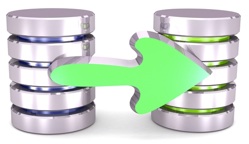Find the right backup methods
 Data backups are essential to your business and an important part of disaster planning. But what methods should you use to back up your critical data?
Data backups are essential to your business and an important part of disaster planning. But what methods should you use to back up your critical data?
Incremental data backups
The most efficient way to back up your data is to run an incremental backup system (Microsoft software refers to this as a differential backup).
You start by taking a full backup, creating a safe copy of all your files. After that, you just back up the files that have changed each day. When this incremental backup starts taking too long, gets too big, or a pre-determined period of time passes (a week is typical) you take another full backup and the cycle starts again.
Incremental backups require lots of media to store the data – one set for the full backup and one set for each incremental backup.
A good option is to store incremental backups on a set of portable hard drives. These can be bought fairly cheaply online from companies such as Amazon, Dabs, eBuyer or Expansys.
Buying nine portable hard drives allows you to perform a backup every day during the week, while holding backups from the last four weeks in reserve. Here's how:
- You label the first four drives Monday, Tuesday, Wednesday and Thursday.
- You use these to perform your incremental backups on the relevant day every week.
- The other five drives are for your Friday backups.
- You rotate the Friday drive each week
This ensures meaning you always have copies of data from every day of the current week, as well as data from the previous four Fridays.
Modern backup software can perform incremental backups very efficiently, only copying the bits of data that have actually changed between each backup. This means backups are fast and take up less space.
Traditional backup media
The backup media is where your backed-up files are stored. There are several options:
- CD/DVD. These have a small capacity so you’ll go through them quickly and costs will mount up. They are easily broken and there is evidence to suggest that their lifetime may be shorter than originally anticipated. Writing data to them is not fast.
- External hard drives. These connect to your computer or network, have a large capacity and are faster than DVDs. They cost from £50 each, but you’ll need a number of these to keep your incremental backups safe. Having said that, they're fast, reliable and a good option for most firms.
- Tape. Magnetic tape is becoming outdated. Although still used in larger businesses, smaller companies rarely use tape because it's expensive, slow and fiddly.
The emergence of cloud computing has provided an alternative backup medium. As a result, an increasing number of companies are eschewing traditional backup tools for internet-based storage.
Online backups in the cloud
As internet connection speeds have increased, online backups services have grown in popularity. A number of companies offer convenient, cloud backups, including Dropbox, Mozy, Livedrive and Trend Micro.
To use online backup, you generally have to install a small piece of software on to your computer or server. This tracks files that change, then automatically backs them up by sending the data to a server in another location.
Although online backup services can be expensive, they're a good way to reduce the hassle of running an in-house backup system every day.
If you do use online backup, look for the flexibility to recover files quickly onto another computer, from any internet connection. Also check your data is encrypted before it leaves your computer, so it can’t be read by hackers.
You may need to investigate where the backup provider holds your data. Make sure you understand the security and data protection issues around cloud computing before you commit to a particular service.
Take multiple backups
Whatever backup methods you prefer, you should always plan to keep more than one copy of your data somewhere safe. For instance, if you use a cloud backup system for daily backups, it's still a good idea to take a weekly copy of your data in-house.
Quite simply, you can't be too careful when it comes to taking care of your more important business data.



